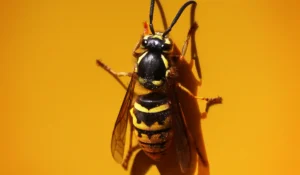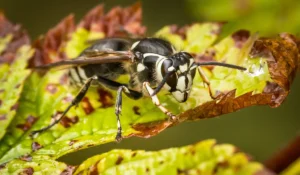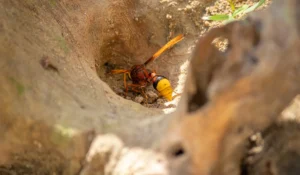Yellow jackets, hornets, and paper wasps rank among the most aggressive stinging pests in Alabama. So when a nest appears under your eaves or in the corner of the garage, it’s easy to feel tempted to handle it yourself. After all, the internet offers plenty of DIY wasp control tips, like dish soap sprays or peppermint oil repellents.
However, these DIY wasp nest removal remedies may not effectively remove your home’s unwanted, stinging guests. Self-applied pest control may worsen the problem.
In this guide, we’ll help you identify the most active species of wasps in Alabama and discuss why most DIY wasp control methods fail. We’ll also walk you through the process of professional wasp control and help you understand why wasp nest removal is best left in the hands of pros.
Key Takeaways
- DIY wasp control in Alabama often leads to incomplete nest removal. It also increases the risk of stings, particularly with aggressive species such as yellowjackets and hornets.
- Misidentifying wasp species can result in the incorrect use of treatment. This may worsen the wasp problem in your home.
- DIY wasp treatments may offer short-term relief, but won’t eliminate nests. Self-applied pest control can go wrong in many ways, leading to stings or even property damage.
- Professional pest control ensures the safe and targeted removal of wasps, especially in hard-to-reach areas such as eaves, wall voids, or rooflines.
Common types of wasps in Alabama
Alabama is home to several aggressive stinging insects. Wasp activity surges dramatically in the state during July, when the wasp lifecycle reaches its peak.
Identifying the species is the first step to choosing the safest and most effective wasp control method:
- Yellow jackets are highly territorial and often nest in wall voids, attics, or underground.
- Paper wasps build umbrella-shaped nests under eaves and overhangs.
- Bald-faced hornets are a type of yellow jacket. These hornets create large, enclosed nests high in trees or on buildings.
- Mud daubers are less aggressive. They typically construct nests in garages, wall crevices, and under eaves.
Each wasp species builds its nest differently and reacts to threats in its own way. That’s why a one-size-fits-all DIY method rarely works.
Why DIY wasp control in Alabama often fails
Incomplete removal of the nest
You might be able to knock down a visible wasp nest, but you won’t eliminate their colony. If queens or workers survive, they can rebuild quickly. Yellow jacket nests are especially difficult to eliminate, as they often nest inside wall voids or underground, much like termites. You will need the right tools and knowledge to remove them from your property correctly.
Increased risk of wasp stings
Wasps defend their nest aggressively. Disturbing a nest, even unintentionally, can trigger a defensive response from the swarm. A single yellow jacket can release pheromones that signal the entire colony to attack. This poses a serious risk for anyone, especially those with a wasp sting allergy. Multiple wasp stings will cause severe pain, swelling, and extreme panic. You may also sustain secondary injuries while trying to escape from the wasps.
Misidentifying the species
Using a repellent or wasp spray specifically designed for flying insects may not always be effective against wasps. Hornets, for instance, often need a stronger, more targeted treatment than paper wasps.
When homeowners misidentify the type of wasp they’re dealing with and use the wrong method, they may trigger an aggressive response and exacerbate the wasp problem.
Inadequate protective clothing
Protective clothing is a must during wasp nest removal. Professional exterminators wear protective clothing designed to block stingers and prevent painful attacks.
Many homeowners neglect protective clothing when dealing with infestations themselves. Many try to remove wasp nests wearing just jeans and a sweatshirt. These clothing layers are insufficient to protect you from wasp stings.
Hornets and yellow jackets are especially dangerous because they sting multiple times and do so aggressively.
The false promise of DIY wasp control methods
You’ll find numerous DIY methods for getting rid of wasps online. These methods may seem safe or easy. However, most will not help you solve your wasp problem, especially if you’re dealing with a large or hidden hornet nest.
- Dish soap and water: This mix can kill a few paper wasps on contact by breaking their outer layer. However, it won’t be as effective on nests tucked in walls, attics, or underground. Spraying this on a hornet nest is not safe and will likely trigger the swarm against you.
- Peppermint oil and other essential oils as repellents: You can use strong-smelling essential oils as repellents against many flying insects. However, peppermint oil and other essential oils cannot drive away wasps from your home or stop them from expanding their colony.
- Wasp traps: These devices can catch individual wasps and reduce wasp activity around food sources, such as garbage cans. However, wasp traps won’t get rid of wasps or eliminate a nest.
What professional wasp control looks like
At Magic City Pest Control, our technicians specialize in safe and effective pest control services that target wasps at their source.
Our trained technicians are experts at identifying wasp species to provide proper pest management. Whether it’s a yellow jacket nest in the ground or paper wasp nests under your eaves or overhangs, we’ve got you covered.
Our team utilizes professional-grade materials that deliver long-term results while protecting pollinators, such as honeybees. We can treat hard-to-reach places up to 25 feet high, which is something most homeowners cannot do safely on their own. In addition to treatment, we also seal entry points and remove wasp nests whenever possible.
If you’ve dealt with the same yellow jacket nest or stubborn paper wasp nests more than once, our pest management approach can help break the cycle and finally get rid of wasps for good.
When to call an exterminator
Call a professional pest control company if:
- You have a wasp nest in a hard-to-reach spot, like a roofline or wall void
- Wasps are entering your home through vents, attics, or siding
- You or someone in your household has a history of allergic reactions to wasp stings
- You’re not sure about what species you’re dealing with
- DIY wasp control treatments have failed or made things worse
At Magic City Pest Control, we don’t just take care of wasp infestations. We stop them before they become a danger and ensure a new nest doesn’t appear. These pests will only become more aggressive and widespread the longer you wait.
Our trained technicians move fast. We identify the species, locate hidden nests, and apply precise treatments, such as Waspfreeze or Bifen, to effectively knock down infestations without harming beneficial flying insects like honeybees.
We don’t just spray. We seal entry points, remove wasp nests, and give you lasting protection. Don’t wait to get stung. Contact us today and let our professional pest control services put an end to your buzzing wasp problem before it turns into a raging disaster.
FAQs
How can I get rid of wasps naturally?
Natural methods like peppermint oil or wasp traps may help reduce activity, but they won’t eliminate a wasp infestation. For complete removal, professional pest control is your best bet.
What do I do if I see a wasp nest on my property?
Don’t disturb it. Wasps may swarm if threatened. Instead, contact a local exterminator to get an inspection and removal plan.
Are yellow jackets more dangerous than other wasps?
Yes. Yellow jackets are more aggressive and often build nests in hidden areas. They can sting multiple times and pose a higher risk, especially to those with allergies.





